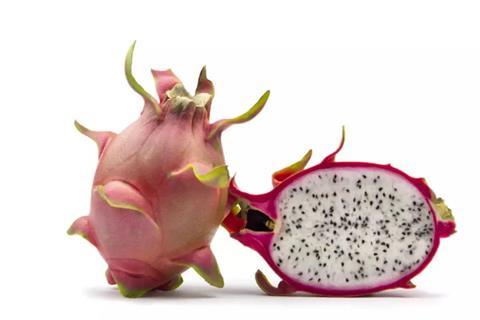VentureFruit joins Plant & Food Research in New Zealand and Southern Horticultural Research Institute programme to commercialise three new varieties

The first new varieties from a joint New Zealand–Vietnam dragon fruit breeding programme are set to be launched to the global marketplace.
Plant & Food Research in New Zealand and the Southern Horticultural Research Institute (SOFRI) in Vietnam have been working together since 2013 to breed new varieties of dragon fruit with excellent grower and consumer characteristics. VentureFruit, T&G Global’s IP management and commercialisation company, has joined the collaboration with exclusive global commercialisation rights to the first three varieties from the programme.
All three new varieties are red-skinned, with a sweeter, more aromatic flavour than current varieties, and with a crisp dense texture. The varieties vary in flesh colour, one with the traditional white flesh most commonly seen, a unique pink-fleshed variety, and a dark, appealing red-fleshed variety.
The varieties are believed to be the first canker-tolerant dragon fruit to be commercialised; canker is a highly destructive disease of dragon fruit, killing plants and causing visible damage to fruit.
Vietnam is the largest dragon fruit supplier in the world and the fruit is highly sought by Asian consumers, despite being native to Central and South America (where it is known as pitaya). Vietnam produces around 1m tonnes of dragon fruit a year, and increased its production area from 10,000ha in 2010 to more than 50,000ha in 2018.
The new varieties have been developed as part of the New Premium Fruit Variety Development project, supported from 2013 to 2021 with funding from the New Zealand Ministry of Foreign Affairs and Trade.
The collaboration between New Zealand’s Plant & Food Research and Vietnam’s SOFRI and Sub-Institute for Agricultural Engineering and Post-harvest Technology (SIAEP) focused on breeding new varieties and improving fruit quality through new growing practices, postharvest handling and storage technologies to better meet overseas market requirements.
The breeding programme is now funded by Plant & Food Research as one of its technology development missions.
VentureFruit’s general manager, Morgan Rogers said the launch of the new varieties was an example of the close horticultural ties between New Zealand and Vietnam.
“These new varieties demonstrate a strategic and innovative approach between all partners involved to create new dragon fruit genetics that taste better and deliver huge grower benefits in terms of canker tolerance. We are looking forward to working with local Vietnamese growers and sharing the knowledge and techniques developed by SOFRI and Plant & Food Research on growing systems,” said Rogers.
“This allows for these unique new dragon fruit varieties to be grown optimally to achieve higher yields, as well as improving production and providing higher returns for growers.”
Initially, the new varieties will be commercially developed in Viet Nam for export markets. Evaluation trials are planned in other potential production regions, including an ongoing trial at Plant & Food Research’s Kerikeri Research Centre in the sub-tropical northern region of New Zealand.
Plant & Food Research chief executive David Hughes said the launch of the new varieties showed the impact possible through a successful international development programme.
“Being able to support people through international development programmes is really rewarding for our scientists, as they can see how their knowledge can directly impact individuals’ lives. However, the launch of these new varieties also demonstrates that these programmes can have a big impact not only at a regional level but also internationally, building networks and skills to transform sectors,” said Hughes.
“We’re really excited to bring two of our long-term collaborators together and support the ongoing growth of the dragon fruit sector, not just in Vietnam but also elsewhere.”
Plant & Food Research scientist Satish Kumar, lead breeder from Plant & Food Research on this breeding programme, said the appointment of VentureFruit licensee for these first three varieties from the programme was a significant milestone for the breeding teams of Plant & Food Research and SOFRI.
“These new varieties of dragon fruit are the result of a strong collaborative effort by the breeding teams at Plant & Food Research and SOFRI, bringing together key areas of strength and expertise from both. We are thrilled with the appointment of VentureFruit as exclusive licensee to take these varieties out to the market,” said Kumar.
Fruit from the new varieties is expected to be available to consumers in 2027, with targets of 250ha planted by 2030.



